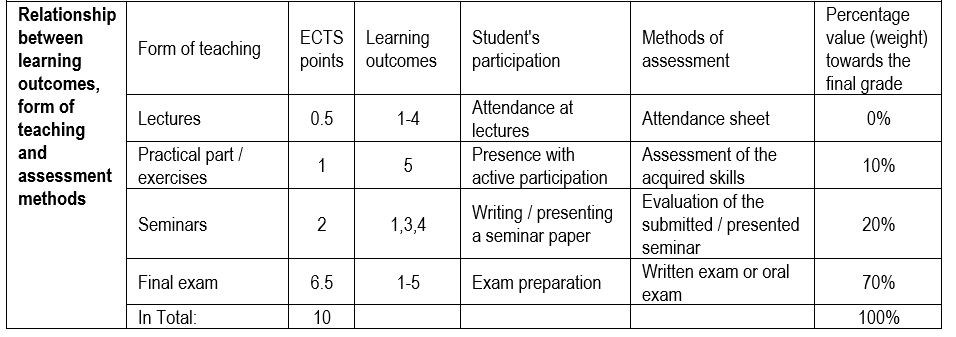The subject of physiology is based on the application of acquired knowledge in biophysics, biochemistry, biology and normal morphology. The objective of the course is to include previously acquired knowledge in understanding physiological processes, to teach students about the functioning of a normal organism and to adopt basic concepts of physiology. Students will learn the principles of measuring physiological phenomena, perform measurements of some physiological parameters and learn to interpret the results of measurements in accordance with concepts. The course develops the ability to resolve problems and critical opinions independently and encourages self-education.
Principles of physiology. Physiology like science, homeostasis. Transport phenomena in the organism and across the cell membrane. System analysis and regulation in biological systems. Membrane potential. Electrical communication (local and travelling potential). Skeletal muscles. Smooth muscles.
Blood circulation – heart – general description, division, heart cycle. Electrical activity of the heart. Cardiac muscle tissue, heart energetics. Cardiac monitoring. Hemodynamics Arteries and veins. Microcirculation (change, supervision). Monitoring of cardiac flow and regulation of arterial pressure.
Breathing. Relationship between structure and function. Ventilation. Mechanics of breathing. Lung diffusion. Pulmonary circulation. Gas transport with blood. Diffusion, perfusion. Respiratory regulation.
Kidneys and electrolyte transport in the organism. Relationship between structure and function. Glomerular filtration in the renal circulation. Kidney function test, clearance. Transtubular transport of substances. Transport of water into the body, regulation of osmolarity. Transport of sodium and water into the organism. Potassium transport in the organism. Acid base physiology – buffers and Davenport's diagram. Acid base physiology – kidneys and pH regulation in organism– kidneys and pH regulation in organism.
Digestion. The structure of the gastrointestinal wall and how it affects the function, monitoring and work of digestion through nerves and chemical transmitters, the importance of motion of the digestive tract, saliva excretion, stomach secretion, pancreatic exocrine, biliary excretion and importance, absorption of digestion food.
Endocrinology. Basics of endocrine system activity, hormone secretion monitoring, mode of action of individual hormone groups, connectivity of nervous and endocrine systems, adenohypophysial and eurohypophysial hormones, thyroid gland, calcium and phosphate homeostasis, sex hormones, pregnancy and childbirth.
Metabolism. Transformation of substances and energy in the organism, metabolism in different physiological states of the organism, regulation of blood glucose concentration, basal metabolism, body temperature control.
Oral physiology. Chewing, swallowing, speech, taste, smell, saliva secretion, teeth, tongue, mucous membranes, oral cavity.
Required course materials:
Guyton i Hall: Medicinska fiziologija, 11. izdanje, Medicinska naklada Zagreb 2006.
Upon completion of this course, students will be able to:
- evaluate the physiological mechanisms of homeostasis regulation;
- assess physiological processes in individual organic systems (nervous, locomotor, cardiovascular, respiratory, urinary, endocrine, immune, reproductive and digestive systems);
- rank physiological processes at different levels of the human body (cells, tissues, organs, organ systems and the whole organism);
- predict the mutual influence of physiological processes between individual cells, tissues, organs and organ systems;
- select physiological tests to assess physiological functions.



